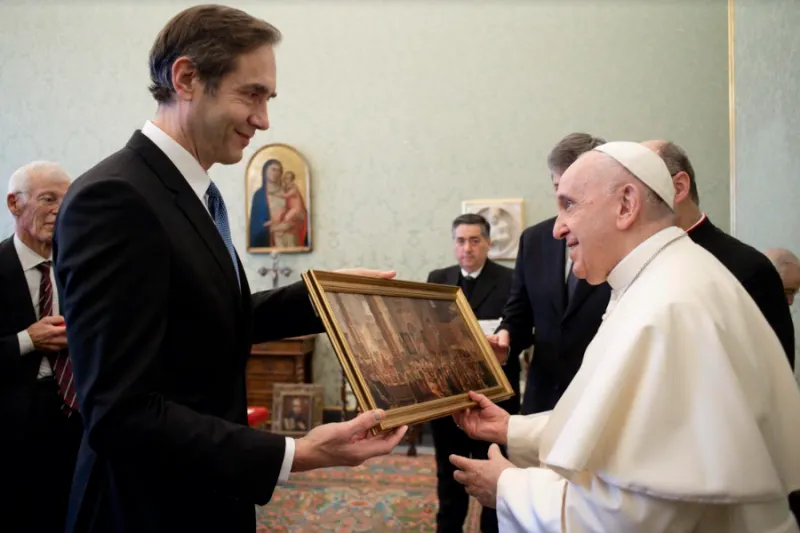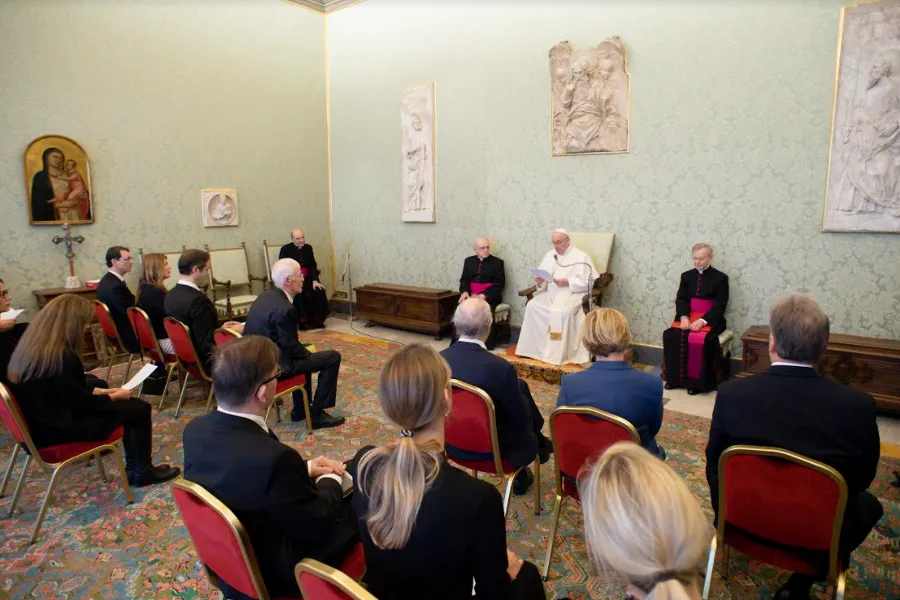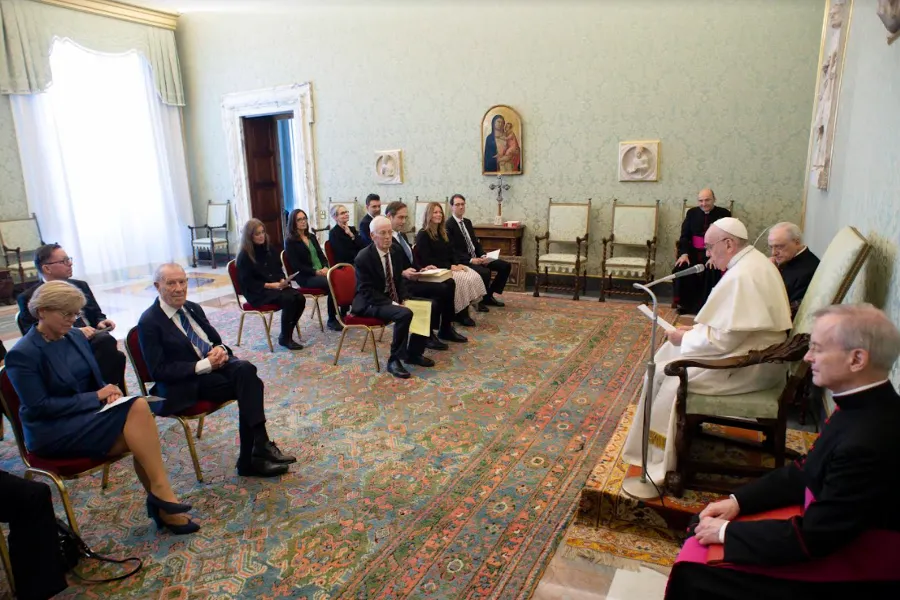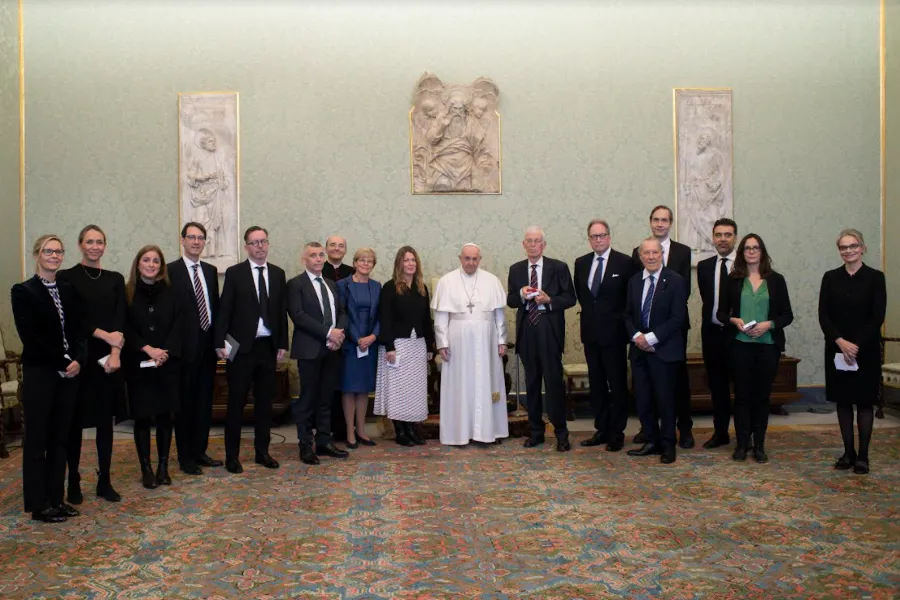
On Thursday of last week, Pope Francis accused Chilean victims of clerical sexual abuse and their supporters in the Church of “calumny”. It isn’t that the Pope doesn’t believe their accusations of abuse. After the Vatican found their accusations credible, and sentenced their abuser, Fr. Fernando Karadima, to a life of prayer and penance – this was in 2011, under Benedict XVI – Pope Francis decided in 2015 to put one of the criminal cleric’s protégés, Bishop Juan Barros, on the See of Osorno, over the objections of the victims, at least one of whom, Mr. Juan Carlos Cruz, says Bishop Barros knew of his mentor’s crimes and even witnessed them.
Things took an ugly turn, when, later in the same year of Barros’ election to the See of Osorno, Francis insulted the people protesting Barros’ appointment. “The Osorno community is suffering because it’s dumb,” the Pope told a group of pilgrims on the sidelines of a General Audience in May of 2015.
The story made the rounds in the worldwide press at the time, and then disappeared.
When a Chilean journalist, who was part of a press gaggle at the gate of the venue in Iquique, where the Holy Father was to celebrate Mass on Thursday of last week, asked Pope Francis about Bishop Barros, the Pope replied, “The day they bring me proof against Bishop Barros, I’ll speak.” Then he doubled down. “There is not one shred of proof against [Barros],” he said. “It’s all calumny, is that clear?”
On the plane home from Perù – the second and final leg of his South American voyage – Pope Francis revised and extended his remarks, saying, “[If] anyone says with obstinacy, without evidence, that [so-and-so] did [such-and-such], it is calumny.” He then said that Barros’ accusers have brought him no evidence, and concluded, “One that accuses without evidence, with obstinacy, this is calumny.”
The first thing to note is the Pope’s problematic use of the term “calumny”, which is not the leveling of accusations in the absence of evidence, but the leveling of accusations for the purpose of damaging another person’s reputation, and/or the repetition of such accusations for the same malicious purpose, without respect to the truth of the accusations. A person who claims to have seen someone commit a crime, however, is not accusing without evidence. The evidence he brings is essentially co-extensive with his own credibility as a witness. In the case of Bishop Juan Barros, his principal accuser is a witness, whose testimony a Vatican court found credible enough to use against Barros’ mentor, Fr. Fernando Karadima.
This would not be the first time Pope Francis’ lexical idiosyncrasies were cause for confusion. I still have not met anyone trained in the sacred sciences who can tell me what Francis means when he speaks of “casuistry” – or “abstract casuistry” – though it is clear he does not mean what is generally meant by the term, i.e. the resolution of moral problems by investigation into the specifics of the case and careful application of the general principles of moral science to the specific case, from within the specifics of the case, themselves.
In this case, the trouble is that no one is asking the right questions.
Why is Pope Francis taking a series of maxims lifted from criminal law, and applying them to a personnel decision? Also during the course of the in-flight presser, in explaining his analysis of the Barros case, Pope Francis said, “I am waiting for evidence to change position [on Barros], but I apply the judicial principle basic in any tribunal: nemo malus nisi provetur – no one is guilty until it is proven [so].” At the risk of belaboring the obvious: the “presumption of innocence” applies to criminal procedure; the only protection it can afford Bishop Barros is found on the other side of a criminal indictment. The other maxim, in dubio pro reo, which Pope Francis invoked in defense of his decision to reduce the sentence against the convicted pedophile, Fr. Mauro Inzoli – over and against the recommendation of the Vatican’s own tribunal – applies principally to the determination of guilt, which in the case of Inzoli was never in doubt, and in any case would have been well known to the legal professionals and trained jurists who handled the case and gave the sentence.
The problem here is not that the Pope has a poor grasp of technical legal terminology. The problem is not even that he keeps using those words, even though they do not mean what he thinks they mean. The former is merely a fact; he is not a lawyer, after all. The latter is symptomatic of an unfortunate quirk of character, which might be overcome or overlooked. The real problem is that he thinks he knows better, and refuses to listen to the people who do. While that quality of character will be frustrating in a parish priest, consternating in a religious superior, and genuinely difficult to manage in a local Ordinary, it will always – always – prove disastrous in anyone who attains to a position of high leadership.
There is another, prior question, though, which no one is asking: Why is Barros a bishop in the first place? During the presser, Pope Francis gave a summary of the matter, saying, “When the scandal with Karadima was discovered – we all know this scandal – we began to see many priests who were formed by Karadima, who were either abused or who were abusers.” That is what abusers do. They insinuate themselves and their favorites – some of whom are also their victims – into the formation process and then into the leadership structures of the Church, and use their advantages of place and position to protect and promote one another.
“In Chile,” Pope Francis went on to say, “there are four bishops, whom Karadima invited to the seminary.” Barros is one of the four. He was consecrated in June of 1995, when Pope St. John Paul II was in Rome and Archbishop Piero Biggio was Nuncio in Chile. Barros served first as an auxiliary in Valparaiso, then moved to the See of Iquique, then to the Diocese for Military Services. When the See of Osorno became vacant, Francis tapped Barros, even though he was known to have advanced under the aegis of a notorious pedophile, and faced allegations of aiding and abetting his mentor’s abuse, allegations that came from at least one victim, whose testimony a Vatican court had deemed credible.
The bishops of Chile had written to Pope Francis, expressing their concern over Barros’ appointment. Francis responded with a lengthy letter, explaining that he had asked Barros to resign as bishop to the forces and take a year’s sabbatical, only after which he might have been considered for another post. The AP reports that Francis’ Nuncio in Chile, Archbishop Ivo Scapolo, conveyed the request, and explained to Barros that similar arrangements were being made for two of the other bishops who came up under Karadima. Scapolo reportedly asked Barros to keep the plan quiet, but Barros named the two others in the letter he wrote announcing his resignation from the military see.
So, Francis decided that the way to handle this tainted and insubordinate prelate was to give him care of the souls of Osorno.
“When [Barros] was appointed [to Osorno],” Pope Francis said, again during the in-flight presser, “and all this protest took place, he gave me his resignation for the second time. I said, ‘No, you go.’ I spoke with him for a long time, others spoke at length with him. ‘You go [back to your See]’,” Pope Francis told reporters he told Barros. The Holy Father went on to say, “They continued to investigate Barros, but there is no evidence – and this is what I wanted to say,” in the remarks outside the venue in Iquique. “I cannot condemn him because I don’t have the evidence,” Pope Francis repeated, “and this is what I wanted to say. I cannot condemn him because I do not have the evidence. But I am also convinced that he is innocent.”
In short, Pope Francis feels he has to leave Barros in place, because he does not have enough evidence to convict him in open court, and because he is personally convinced of Barros’ innocence.
Speaking in Santiago de Chile in 2011, after the Vatican court came back with the guilty verdict against Karadima, Fr. Antonio Delfau, SJ, of the Chilean province – currently serving as Assistant to the General Treasurer of the Society – is quoted in a New York Times report on the story as saying, “[The conviction] is going to mark a before and after in the way the Chilean Catholic Church proceeds in cases like these, or at least it should.” Delfau went on to say, “From now on, every case of sexual abuse must be treated with meticulous care and not be based on the gut feeling of a given Church official.”
If you value the news and views Catholic World Report provides, please consider donating to support our efforts. Your contribution will help us continue to make CWR available to all readers worldwide for free, without a subscription. Thank you for your generosity!
Click here for more information on donating to CWR. Click here to sign up for our newsletter.








Pointed and remarkably essayed. “That is what abusers do. They insinuate themselves and their favorites – some of whom are also their victims – into the formation process and then into the leadership structures of the Church, and use their advantages of place and position to protect and promote one another” (Altieri). This is what is remarkable. It’s insider knowledge however garnered by Altieri that I thought the case since my graduate studies in Rome. It speaks to homosexual networking within the Church’s most vulnerable and eventually the most powerful. Altieri makes another significant point, that “gut feeling” apparently the Pontiff’s “conviction” [how on earth can he be convinced?] that Fr. Antonio Delfau, SJ repudiates citing need for meticulous future investigation. I won’t attempt to judge Pope Francis’ conscience though it registers as strongly favoring the abuser v abused as was the infamous Fr Inzoli case. What can be said should instead be what must be said and opposed, that it indicates paradigmatic desire for normalization of previously held untoward behavior.
“It isn’t that the Pope doesn’t believe their accusations of abuse.”
I wouldn’t speak for the Pope in that manner. Too many people are trying to cover up for him, suggesting that he is just not very smart, or just coming down with dementia. Wrong answers. He is highly intelligent and, besides the few curve balls/Peronism meant to make himself appear orthodox (Tuesday:”Uh, yeah, of course I’m a pro-life Pope.”; Wednesday: “Here’s a Vatican award, Woman Who Procures Abortions! You do great work!”, etc.), over time he is very consistent with his vindictiveness, anti-orthodoxy, and, sad to say it, apparent cover up for abusers.
Folks, this lying to cover up for the Pope and the “Petrine Office” has to stop.
Every indicator points to Pope Francis covering up for multiple sexual abusers. The Barros incident is only one. There is also: Msgr. Battista Ricca, the priest who abused choir boys in Argentina and Italy, Rev. Mario Napoleon Sasso, Fr. Rubén Pardo, Fr. Julio César Grassi, Brother Fernando Enrique Picciochi, S.M., and if I remember correctly, there are at least 2 more cases which appear to indicate Pope Francis covered up and/or facilitated abuse.
Those who continue defending this guy are becoming complicit in his apparent cover up of abusers. “Blind guides” and even “children of Satan” (Matthew 13:38) is what Jesus calls many of you priests and prelates for your propagating of anti-Christ teachings, either directly or indirectly through your support for Pope Francis.
While that quality of character will be frustrating in a parish priest, consternating in a religious superior, and genuinely difficult to manage in a local Ordinary, it will always – always – prove disastrous in anyone who attains to a position of high leadership…..YOU MEAN HIGHER THAN A BISHOP, like the Holy Father???
Americans recently asked that Trump receive a thorough exam to include psychological. Pope Francis is 81 years old… should he be asked to do the same? Irrational!
The Dictator Pope.
Precisely. Not dumb, not suffering from dementia, not misled by advisors, but a Peronist dictator lording it over the people.
As Lord Acton observed, “Despotic power is always accompanied by corruption of morality.”
Defending paedophiles is simply to be expected from a morally corrupt man.
Are you Colonna??????….
I’m ashamed to call myself a Catholic.
To Bryan Parry: Don’t be ashamed to call yourself a Catholic. Remember, Jesus is Head of His Church. Pray for the Pope and the Church. We must remain faithful.
Ashamed for who? Or are you pointing accusing fingers at yourself or to whom? If you consider yourself a truly believing Catholic, then you should be on your knees, not covering yourself in shame.
While I disagree with Francis on this very much, I actually feel sorry for him. Francis is an elderly man. Why are we putting octogenarians in charge of a world wide organization? His job would tax and tire a 30 year old. Gaffes, mistakes and even erratic behaviour are bound to happen when you put an elderly person under such stress. I sincerely hope that in the next conclave the Cardinals will think outside the box and look to a qualified bishop somewhere in the world. Surely there is a young, orthodox, dynamic bishop out there who could lead the Church.
Someone like Karol Wojtyla who was 58 when elected Pope. His long Pontificate and the distaste of same by many liberal members of the curia and conclave played a major role in picking an elderly man as the successor to Benedict XVI.
May the Saint Gallen mafia, which elevated Jorge Bergoglio, lose all of its disastrous influence.
I think that’s a very good idea.
The only caveat would be that it would have to be tied to a mandatory resignation, maybe at age 70 or so, otherwise the same guy will be pope for too long. With John Paul it was fine, he was a great pope and a saint. But imagine if Pope Francis had been elected pope when he was 50? We’d be in the 30th year of his pontificate….
You have stated the obvious Andrew, the Conclave is driven by a cohort of perversion, in the back ground, to heavily influence the choice. Can we dare to think that the Holy Spirit had been eliminated in choosing the senior Bishop of the Catholic Church. Am I ready to jump ship, no. The Bark of Peter is still the best ship on the waters of grace to arrive on the shores of a heavenly place.
“ a Cohort of perversion “
Perfect.
“ a Cohort of perversion “
Perfect.
The Church’s present Pope recruiting strategy is akin to a huge multi-national corporation saying:
“Hey guys, we need a new CEO. Let’s drive down to the local retirement home and find a guy who has some business experience from the 1970s and put him in charge. Then we’ll work him 24/7, make him travel all over the world, have him reform the company from top to bottom and give him unlimited power. What could possibly go wrong?!”
“The problem with Pope Francis’ defense of Bishop Juan Barros is not just that Francis has a poor grasp of technical legal terminology or that he misuses certain words, but that he thinks he knows better and refuses to listen to the people who do.”
Very much like Mr. Obama. He too was quite certain that he knew better than anyone else what to do in a given situation. Interesting,
I think Francis seems like a ‘typical’ theologically liberal, culturally conservative Latin American Jesuit of the Vatican II generation, Everything he says and does falls in line with that profile, and people are shocked or appalled time and again. I’d say it was surprising someone like Protestant evangelist Luis Palau praises him so highly, but then I think of guys like Billy Graham’s grandson Tullian Tchividjian and his ‘free grace’ and it makes more sense. Depressing that so many institutions and faces are becoming so much less reliable.
“he keeps using those words, even though they do not mean what he thinks they mean.”
Caught your Princess Bride reference there.
They are Not Pedophiles they are Homosexuals!
We will never Address this Cancer within the Church until we Name It.
Read Phillip Jenkins 1996 Book – “Pedophiles and Priests”
We must not let terminology hide the truth. When people become attached to their favorite sins they deceive themselves into thinking they are no longer sins. God is not deceived.
Francis is Peter. Mr. Altieri is a columnist on an online magazine.
Which of the two should a Catholic be guided by?
We should be guided by Jesus Christ, the Holy Spirit, scripture and the traditional teaching of the church.
amen
Francis is no Peter, only his successor. Examining the CVs and writings of Altieri and Bergoglio, PhD Altieri gets the nod over Jesuit Bergoglio by a landslide.
Given his pronouncements I would say he thinks he knows better than anyone else on all church topics and that’s become a huge problem. Sexual predators are sociopaths and are often very charming. I should know, mine was like this.
Overlooked in comments on Pope Francis is the fact he comes out of the persuasive,but disasterous, atmosphere of South American invented “”Liberation Theology” condemned by his two Papal predecessors. It’s obsessive predilection in secularizing and politicizing Poverty,unmoored from Catholic Charity, prompted Pope Benedict to write the following. IIn his book, “Journey Towards Easter.” He wrote:”The Liberation theology of Marxist inspiration restrict Jesus to the Old Testament, invert the relationship of the Testaments and, instead of being interpreted as a precusor of Jesus, Moses, the political liberator becomes the model of Jesus….” Should we, then be surprised e.g. a German atheist, a fanatic on global warming, now heads the Vatican Academy of Science, appointed by Pope Francis. How prophetic must the following words of Pope Benedict, in the same book, p.17, be interpreted in observing the actions of the present Pontiff. “…Not the Cross, but the Exodus becomes central to Scripture, and the Promise robbed of it’s spiritual content, returns to it’s earthly sense, the Political. Should we be surprised the Chief Exorcist of Catholic Ireland is calling for the appointment of more exorcists to combat the growing power of Satanism in Ireland!